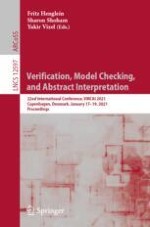2021 | OriginalPaper | Buchkapitel
Generative Program Analysis and Beyond: The Power of Domain-Specific Languages (Invited Paper)
verfasst von : Bernhard Steffen, Alnis Murtovi
Erschienen in: Verification, Model Checking, and Abstract Interpretation
Aktivieren Sie unsere intelligente Suche, um passende Fachinhalte oder Patente zu finden.
Wählen Sie Textabschnitte aus um mit Künstlicher Intelligenz passenden Patente zu finden. powered by
Markieren Sie Textabschnitte, um KI-gestützt weitere passende Inhalte zu finden. powered by
